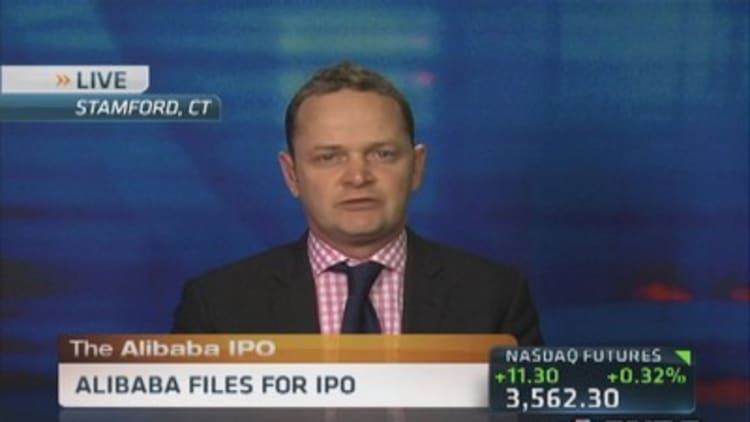Alibaba's IPO—almost certain to be one of history's largest—could open the gates to other Chinese companies listing on U.S. exchanges—and, in the mid- to long-term, competing against U.S. companies eye-to-eye, say analysts.
However, don't expect the next wave of companies to pack quite the punch that Alibaba's expected to have—at least not at first.
"I think it would be wise for other Chinese companies to ride on the back of Alibaba's coattail, but I don't think they'll be as successful," said Anthea Zhang, professor of strategic management at the graduate school of business at Rice University. "[Chinese companies like Alibaba] don't pose a short-term threat to U.S. businesses, but long term, I think they'll feel a threat."
One necessary trick for those other businesses is finding a way to stay as independent as Alibaba has managed to over the years.
"If you look at what has kept other major Chinese companies, like Huawei, from succeeding, it is usually political restrictions from being too closely tied to the Chinese government," said William Kirby, a professor of Chinese studies at Harvard.
Huawei, a Chinese networking and telecommunications company, was banned from network contracts in the U.S. amid fears that its systems could have 'back doors' that could allow the networks to be accessed by state-run hackers.
While Alibaba hasn't expressed an immediate desire to expand into the U.S. market, it's widely assumed it will ultimately do so (it has already made investments in U.S. startups like Lyft). And the timing of the IPO could be a first step towards that.

"They're putting their flag in the sand," said P.J. McNealy, CEO and founder of Digital World Research. "You want to do that before a company like Amazon even further expands its footprint."
Waiting in the wings is JD.com, China's second largest e-commerce marketplace, which filed for a $1.5 billion IPO in January. Smaller e-commerce sites like other e-commerce upstarts, like dangdang.com and Yihaodian (of which Wal-Mart holds a 51 percent ownership stake), could follow at some point.
Read MoreHow Yahoo stands to benefit
Earlier this month, Chinese social network site Weibo, a Twitter-like micro-blogging site that's part of the online media company Sina, saw its stock price rise 40 percent above its IPO price at one point, before settling down to a 19 percent day one gain.
Meanwhile, Tencent is already publicly traded in the U.S., but has largely focused on its gaming division here. The company also owns one of the world's largest instant messaging systems, a large social network and creates original content, giving it plenty of room to expand both its presence and share price.
Alibaba reached its level of success in part because it found a business field where the Chinese government had no presence. Other start-ups are unlikely to be quite as lucky. But in areas like Zhongguancun, which has been likened to Silicon Valley, and Hangzhou, which Kirby describes as a "major center for private enterprise," officials are doing their best to protect private enterprise, giving entrepreneurs the chance to break away from the pack.
And there's plenty of opportunity in China to establish a good foundation.
Read MoreWould you buy Alibaba shares?
"We expect the rapid shift from offline to online in Chinese consumer shopping behavior to continue," said Ana Swanson, an analyst for JL Warren Capital, which specializes in big data-driven China-focused equity research. "The rapid spread of mobile internet in China is leading to a 'leapfrog phenomenon,' where consumers in less populated areas are gaining access to brands online even before they are able to visit the brick and mortar stores."
That could lead to more sizable Chinese companies, which may look to follow Alibaba's lead when they're ready to go public.
—By Chris Morris, Special to CNBC.

